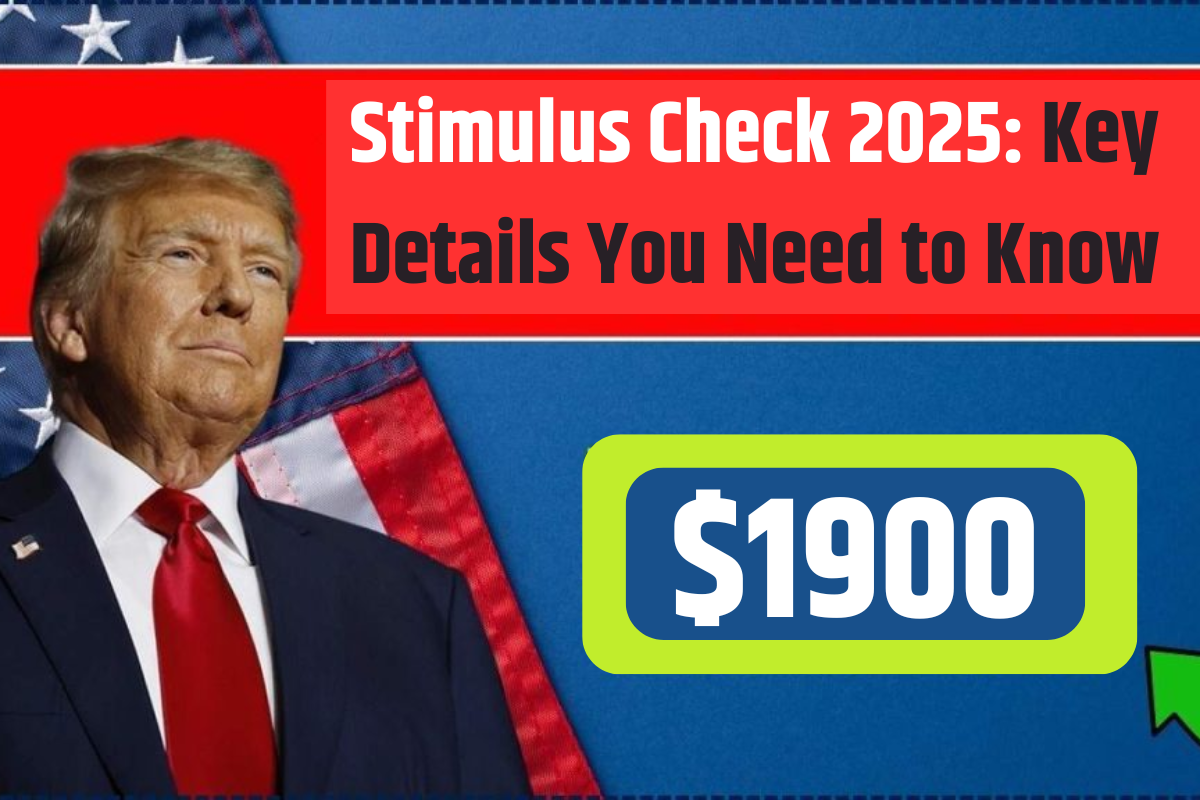The COVID-19 pandemic has impacted millions of Americans in various ways, and the government has offered relief packages in response to the crisis. As 2025 approaches, many are wondering whether a new round of stimulus checks will be issued to provide continued financial support. Recently, there have been discussions surrounding the possibility of an $1900 stimulus check, designed to help struggling households.
This article will break down everything you need to know about the $1900 stimulus check, including eligibility, distribution details, and frequently asked questions (FAQs).
What Is the $1900 Stimulus Check?
The $1900 stimulus check is a proposal under consideration by lawmakers in response to the ongoing economic challenges faced by Americans. This payment would serve as a direct cash injection to eligible individuals and households. If the proposal becomes law, the stimulus checks would aim to provide additional support to those who continue to struggle with rising inflation, housing costs, and other financial burdens in 2025.
Who Is Eligible for the $1900 Stimulus Check?
Eligibility requirements for the $1900 stimulus check would likely be similar to previous rounds of government relief, such as the CARES Act and the American Rescue Plan. While final details are still pending, the following groups are expected to be eligible:
- Individual Taxpayers: Single individuals with a qualifying income level, likely below $75,000 annually, will be eligible for the full $1900 payment.
- Married Couples: Married couples filing jointly who meet the income requirements (likely below $150,000 annually) will receive the full $3600 payment.
- Dependents: There may be an additional $600 or more for dependents, depending on the final details of the legislation.
- Social Security and SSI Beneficiaries: Those receiving Social Security benefits, including Supplemental Security Income (SSI), may be eligible for the stimulus check as well, similar to the last rounds of relief payments.
- Unemployed or Low-Income Households: People experiencing job loss or significant financial hardship may be prioritized for the stimulus check.
It’s important to note that the eligibility criteria could change depending on legislation passed in 2025.
How Will the $1900 Stimulus Check Be Distributed?
The distribution process for the $1900 stimulus check will likely mirror past stimulus efforts. Payments may be sent in the following ways:
- Direct Deposit: For individuals who have filed taxes and provided direct deposit information, the stimulus check will likely be sent directly to their bank account.
- Physical Checks: Those who don’t have direct deposit information on file may receive a paper check mailed to their address.
- Prepaid Debit Cards: In some cases, individuals may receive prepaid debit cards as a form of payment, similar to previous stimulus rounds.
When Will the $1900 Stimulus Check Be Issued?
As of now, no exact date has been set for the distribution of the $1900 stimulus check. However, if passed, it’s expected that the payments could begin in the early months of 2025, likely within a few weeks or months after the legislation is signed into law. Keep an eye out for official announcements from the IRS for specific timing.
Will the $1900 Stimulus Check Be Taxable?
One of the key questions people have about stimulus payments is whether they will be taxed. Based on past stimulus payments, the $1900 check is expected to be non-taxable. This means recipients will not have to pay income tax on the money received. However, it’s important to consult a tax professional for specific guidance, especially if other factors affect your tax situation.
Can the $1900 Stimulus Check Be Garnished?
The $1900 stimulus check is designed to help individuals and families who are financially struggling. In general, stimulus payments are not subject to garnishment for debts like credit card bills or personal loans. However, there are some exceptions to this rule. For example, stimulus checks can be garnished for child support payments or federal debts, such as overdue student loans.
Frequently Asked Questions (FAQs)
Q: How do I know if I qualify for the $1900 stimulus check?
A: The IRS will release eligibility guidelines once the proposal is approved. Generally, individuals who have filed taxes in the previous years and meet the income requirements will qualify.
Q: Will my dependents affect the amount of my stimulus check?
A: Yes, if you claim dependents on your tax return, you may be eligible for additional payments. For example, families with children may receive extra funds to help with household expenses.
Q: How can I check the status of my stimulus payment?
A: The IRS will likely provide an online tool, similar to previous rounds, that allows individuals to track their stimulus payment status.
Q: Can I receive the $1900 stimulus check if I didn’t file taxes?
A: If you didn’t file taxes, you may still be eligible for the stimulus check, especially if you receive Social Security or other federal benefits. The IRS will release guidance on how non-filers can claim the payment.
Q: What happens if I move before receiving my payment?
A: If you change your address, it’s essential to notify the IRS to ensure your payment is sent to the correct location. You can update your address through the USPS or via the IRS website.
Conclusion
While details surrounding the $1900 stimulus check are still being finalized, the goal remains to provide much-needed financial assistance to individuals and families facing economic hardship. Be sure to stay informed on the latest updates regarding eligibility, distribution methods, and timing. With a $1900 payment on the table, this financial relief could go a long way toward helping Americans rebuild in 2025.
